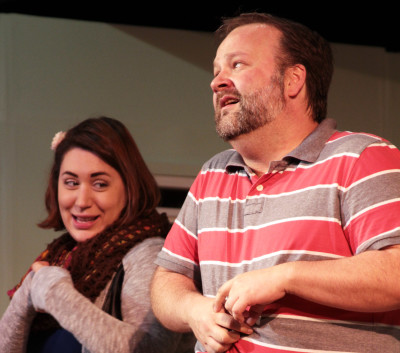BY CARY GINELL
The Boys Next Door, Tom Griffin’s serio-comic play about four mentally disabled men living in a communal home in New England, makes its debut at the Elite Theatre Company’s main stage next Friday evening. The show requires a deft hand in directing as well as acting, to ensure that audiences identify and empathize, rather than pity the characters, whose minds aren’t quite firing on all cylinders. We spoke with director James C. Stevens last week, and discussed his approach in directing the play.
VCOS: The Boys Next Door straddles a line between a character-based comedy and a study about the mentally disabled. Is all of this spelled out in the scenes and dialog or do you, as the director, have the responsibility to maintain this kind of dramatic stasis?
JAMES: I think you’re right when you suggest that it’s definitely on me to make sure that we observe and honor what the playwright intended. I think he did a very good job on the page making sure that the audience should not be laughing at these characters and that they should be laughing with them and getting to know them in a very personal way. There are epiphanies and revelations in the show that are on the dramatic side and they are well-earned. But it’s also not just a comedy – it goes right down the middle. It is my job to make sure that the actors are not doing any parodies or making fun of somebody with a mental disability. They need to get a good sense of what the disability is and what that means to that character. One of the characters isn’t really mentally disabled, he’s a schizophrenic, which is a different thing, and has been abused as well. Austin Robert Miller is doing a fine job of riding that line with a character that is very enjoyable to watch, very connectible, he has lots of very funny moments, but when he is finally connected with his father, and the drama of that scene unfolds, it becomes incredibly heartbreaking.
VCOS: Do you have any personal experiences with mentally disabled people that you use in helping to direct the actors?
JAMES: Yes, actually. I had a neighbor when I was growing up. He was an adult of about 30 and I was a teenager, and he would stand on the street corner, not as a beggar, but would just stand there and rock back and forth, say hi to people, and talk to himself. It’s just what he did. And I got to know him, say hi, and chat, and eventually, I realized that the ability to communicate with him was incredibly limited, yet there were a lot of things going on in his mind. He had his own agenda, his own needs and desires; they were just very foreign to me. And I found that fascinating. In our play, Arnold is played by Justin Radford, who works with handicapped children, so he has a very strong connection to the material in understanding what that life might be like.
VCOS: How do you instruct the actors to understand motivations behind characters that do not have rational motivations for the things that they do. Or do they?
JAMES: I think they do. Rationality is a relative thing. As an example, Lucien is the most disabled of the group. He describes himself in the play – in a moment where he is breaking character and speaking in an internal voice – as somewhere between a five-year-old and an oyster, which he says with great irony. He is certainly unable to carry on a regular conversation. He has his own rational, though, and his own motivations. He is truly a man-child with the mental capacity of a four or five-year-old, but he is a man nonetheless. So I tend to say things with that in mind – for Norman, for Lucien, and to some small degree, for Arnold. I remind them of their childhood – how does a five-year-old ask for something? Is it direct? Is it not? When they’re scolded, how do they behave? Do they want to please? Do they need approval? And these people need to get approval from their social worker, the character Jack. But they want what we all want: love, security…for Norman, he wants keys. All of them have their own rationales. But theirs are just askew from our own.
VCOS: Does the likability of the characters help make this play what it is? How would it work if the characters were simply not likable?
JAMES: It’s interesting. I think the minute you make a character unlikable, then it becomes a drama. It’s hard to make a comedy with unlikable people unless the person is playing a villain. But in a comedy, your main characters need to be likable. There is a character in the play, Barry’s father, who is not a good person, and this is definitely one of the elements of the play that brings drama to it.
VCOS: What did you look for when casting? Were the physical descriptions of the characters the most important aspect?
JAMES: Yes. Invariably, however, I find that talent wins. There are two elements to my job. If my casting is right, then 90% of my work is done. The two things are – can they do the job, and are they going to do anything to throw the audience out of the experience. In other words, was the casting too off the mark where the audience says, “We don’t get this.” So if it throws the audience out of the play, that’s bad. Generally speaking, within that, I have a lot of latitude to cast somebody who is physically exactly right as the author intended, or something a bit askew, as long as it doesn’t disrupt the reality that the playwright intended in the first place. I have a really, really talented cast. Almost everybody in the cast are Ventura County alumni. A couple who you may not know, like Justin Radford, come from L.A. Tosca Minotto, who won the Four Star Theatre Award last year for Outstanding Featured Actress, is also from L.A. We also have veterans like Ron Rezac who are stalwarts of theater up here.
VCOS: I’ve noticed that most important characters in plays go through some kind of growth between the play’s start and finish. Do any of these characters grow, and if they don’t, how do you justify a satisfying conclusion?
JAMES: That’s actually a really fantastic last question. Ultimately, there is a path that they go on, but they don’t change that much, at least not the boys. Jack, who is the social worker, goes through a great deal of change. It is the very realization that these people can only change so much, and cannot really change their lives to any great degree, but that he can, is the greatest source of frustration for him and ultimately the main reason why he may need to move on. The fact that they are pretty much fixed in their lives is part of the poignancy of the play.
VCOS: It kind of reminds me of Rain Man, where Tom Cruise’s character learns to appreciate Dustin Hoffman’s character, even though Hoffman’s character doesn’t change at all.
JAMES: Yes, and that movie makes a lot of the same points that this play does.
**********************
The Boys Next Door plays at the Elite Theatre Company beginning February 28. For dates and show times, see the VC On Stage Calendar.






No Comments